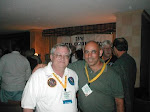I recently found out that I might be an idiot. But the jury is still out on that.
Who knew?
Wait... don't answer that. :-)
I spend so much time introspecting, that apparently I don't see things around me very well. (exospecting..???) But I'm not entirely convinced. I turn the scope inward quite regularly, but I guess I am poorly adept at looking at my environs.
Here's the question..... Would you want to know if you were an idiot?
Just when I think I have a handle on things, someone comes along to tell me that I was holding the wrong handle. (sigh)
I have always done pretty well at assessing people and situations. That is, as long as I'm not in the picture. Score one for objectivity.
This issue fits in with what I call my "Frame Theory".
We go through life looking at our world through a particular framework. Things within the frame are focused and clear. This is our world. Think of this frame as our relative world. This is what is relative to us. We develop our opinions and judgements about the world within this frame. We have to. Our brain is designed to allow us to function efficiently within this frame.
As we approach the edges, things get fuzzy. The lines become blurred. Our experiences determine how broad our frame is. But when we encounter something that isn't "usual" its classified as "outside" our frame. Since it is outside our frame, we do one of two things....
try to make it fit... or disregard it. It becomes peripheral junk. Kind of like all the garbage orbiting the Earth. It there... but we don't pay much mind to it... that is until a piece of it comes hurtling toward us at 22,000 mph.
Then we have to acknowledge it. And that requires effort. That effort requires energy. That energy has to come from somewhere, therefore it is taxing on our mental resources. Follow me so far?
So.... our response to the "peripheral junk" depends entirely upon what we already have within the framework. So we consciously or unconsciously apply familiar experiences to this peripheral material. That is us trying to make things fit. When that doesn't work... meaning... when we still can't make sense of it... we discard it. But we can't always do that. So this is when we are hit with anxiety.
Now, anxiety isn't always a bad thing. It kind of forces us to deal with the offending new material. Until it gets resolved, that is, until we can make sense of it, we will continue to have anxiety about it. Anxiety can be quiet and calm, but it is merely a term to describe a sense of mental discomfort. When it becomes more serious, physical manifestations can occur.
This whole process has a name... in Social Psychology its called "Cognitive Dissonance". Everyone deals with it on a daily basis, and we make small adjustments to our frames. These adjustments are called "experience".
With all that said..... I'm at the fuzzy edge right now. I'm having to reevaluate the world just outside my frame. Damn.... and I was doing pretty well for quite a while.
As a result.... the conclusion to this exploration is as of yet undetermined.
I guess we'll just have to wait and see. :-)
Be well.
5 years ago




1 comment:
Ah, Cognitive Dissonance was one of the most useful concepts I took from Social Psychology. I experience it OFTEN.
Regarding the Fuzzy Edges: I live there, 99.9% of the time.
Post a Comment